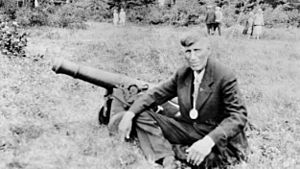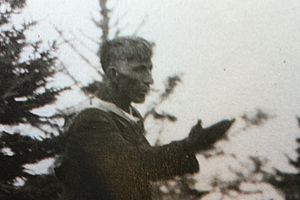Gabriel Sylliboy facts for kids
Quick facts for kids
Gabriel Sylliboy
|
|
|---|---|

At Nova Scotia, 1930s
|
|
| Mi'kmaq of First Nations leader | |
| Personal details | |
| Born | 18 August 1874 Whycocomagh reserve on Cape Breton, Canada |
| Died | March 4, 1964 Sydney, Cape Breton County, Canada |
| Mother tongue | Mi'kmaq |
Gabriel Sylliboy (born August 18, 1874 – died March 4, 1964) was a very important Mi'kmaq leader. He was the first Mi'kmaq person to be elected as Grand Chief in 1919. He was also the first to bravely fight for Canada to officially recognize the treaties made with First Nations people. These treaties were agreements between Indigenous peoples and the government.
Contents
Early Life of Gabriel Sylliboy
Gabriel Sylliboy was born on August 8, 1874. His birthplace was the Whycocomagh reserve. This reserve is located on Cape Breton Island in Canada. His parents were named John Sylliboy and Mary Barrington.
Becoming a Mi'kmaq Leader
Before 1918, Gabriel Sylliboy was already a well-known religious leader. He lived on the Whycocomagh Reserve. He was also a Grand Captain of the Mi'kmaq Grand Council. This council is an important governing body for the Mi'kmaq people.
After Chief John Denny Jr. stepped down in 1918, Gabriel Sylliboy was elected. He became the first elected Grand Chief of the Mi'kmaq.
Fighting for Treaty Rights
In 1929, Gabriel Sylliboy faced a challenge. He was found carrying muskrat pelts. He was then arrested for hunting out of season. He was found guilty in court.
During his trial and later appeal, he used the Treaty of 1752 as his defense. This treaty was an agreement from 1752. However, he lost both his court case and the appeal. This meant the court did not recognize his treaty rights at that time.
Later Life and Passing
Gabriel Sylliboy passed away on March 4, 1964. He died in Sydney, Cape Breton County. He could not speak, read, or write English during his life.
Even so, he strongly believed in education. He made sure his grandchildren learned English in school. At the same time, he wanted them to stay connected to their Mi'kmaq culture and language.
Gabriel Sylliboy's Lasting Impact
Gabriel Sylliboy's fight for treaty rights had a huge impact. Many years after his death, his case helped change Canadian law.
Supreme Court Overturns Decision
In 1986, the Supreme Court of Canada looked at Mr. Sylliboy's case again. They overturned the original decision. This happened in a case called Simon vs. The Queen.
James Simon, a registered Mi'kmaq person from Nova Scotia, was involved. He had relied on the same Peace and Friendship Treaty as Sylliboy. The Court found that Simon had the right to hunt for food.
Chief Justice Brian Dickson wrote something important. He said the language used in Sylliboy's original case showed old biases. He stated that "Such language is no longer acceptable." This meant the way Indigenous people were treated in the past was wrong.

Further Treaty Recognition
Fourteen years later, in 1999, another important ruling happened. It was called R v Marshall. This ruling stated that treaties from 1760 and 1761 were still valid. They showed that the Mi'kmaq people could earn a living from hunting and fishing. This was how their ancestors traded with Europeans.
This case was brought by Donald Marshall Jr.. He was the son of a Mi’kmaq grand chief. His case helped confirm the rights of Indigenous peoples.
Official Apology and Pardon
In February 2017, Gabriel Sylliboy received a special honor. The Lieutenant Governor of Nova Scotia, J.J. Grant, gave him a posthumous pardon. This means he was officially forgiven after his death.
Grant said this pardon "helps acknowledge the struggles of the past." It also "honour[s] those who sought to exercise their rights." He added that it helps people understand and value what the Mi’kmaq have given to Nova Scotia and Canada.
On February 16, 2017, the Premier of Nova Scotia's office issued an official apology. They stated:
We recognize that the treatment of the grand chief was unjust. The province apologizes to the family of Grand Chief Sylliboy and the Mi'kmaw community for this injustice. An important step on our path toward reconciliation is recognizing the mistakes of the past so we can build a better future for all Nova Scotians.
Grand Chief Ben Sylliboy of the Mi’kmaq Grand Council spoke about the pardon. He said that Mi’kmaq people celebrate their rights today because of heroes like Gabriel Sylliboy.
See also
 | Valerie Thomas |
 | Frederick McKinley Jones |
 | George Edward Alcorn Jr. |
 | Thomas Mensah |

